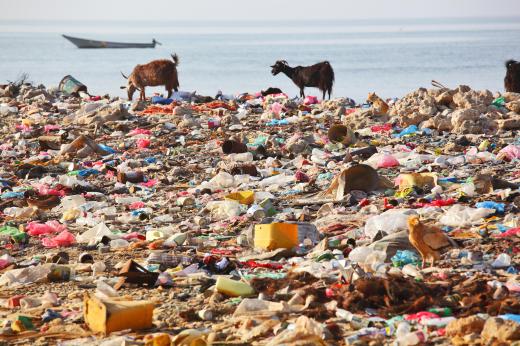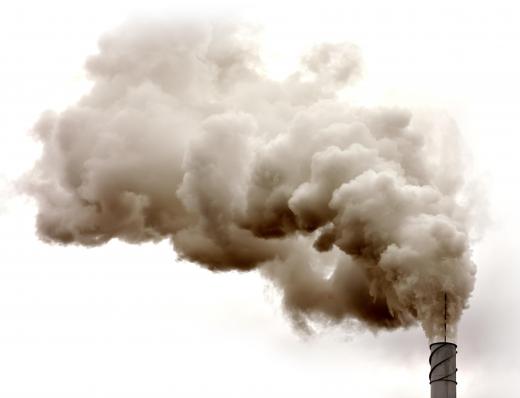What is Environmental Degradation?
 Mary McMahon
Mary McMahon
Environmental degradation is a process through which the natural environment is compromised in some way, reducing biological diversity and the general health of the environment. This process can be entirely natural in origin, or it can be accelerated or caused by human activities. Many international organizations recognize environmental degradation as one of the major threats facing the planet, since humans have only been given one Earth to work with, and if the environment becomes irreparably compromised, it could mean the end of human existence.
There are a number of ways in which environmental degradation can work. In a classic case, resources simply become depleted. Air, water, and soil are all resources which are vulnerable to depletion through overuse, as are natural resources like minerals and oil deposits. Habitat pressures which force animals into a small area can also contribute to resource depletion, as the animals consume a high volume of material in a small area.

Pollution is another cause of environmental degradation. When the environment becomes polluted, it means that toxic substances have rendered it unhealthy. Pollution can come from a variety of sources, including vehicle emissions, agricultural runoff, accidental chemical release from factories, and poorly-managed harvesting of natural resources. In some cases, pollution may be reversible with costly environmental remediation measures, and in other instances, it may take decades or even centuries for the environment to cope with the pollution.

Simple damage is also a common issue. Clearcutting, unsustainable development, and erosion are all forms of environmental damage. If the damage is extensive, the environment may not be able to reach a state of balance on its own, and the problem could become compounded. Erosion as a result of bad agricultural practices, for example, can strip the earth of its valuable topsoil, leaving coarse, useless soils behind. This infamously occurred in North America during the Dust Bowl of the 1930s, in which drought, poor farming practices, and severe weather led to a widespread stripping of fertile topsoil from farmlands.

A number of social and legal issues are involved in environmental degradation, ranging from the need to provide living space for humans to questions about who is responsible for environmental cleanup. For example, if a company acquires a company which released toxic chemicals into the environment in an era when this practice was commonplace, it may argue that it has no legal obligation to clean up the chemicals, although it may be obliged to do so under ethical principles.
AS FEATURED ON:
AS FEATURED ON:















Discussion Comments
What are the determining charges for controlling environmental degradation?
What is environmental phenomena?
I want to know the positive effects of environmental degradation.
What are other natural examples of environmental degradation?
environmental degradation detection and monitoring in the so called lake naivasha basin. currently doing my research on this vitally important topic. need your comments.
@ Anon32703- In the short-term most environmental degradation problems tend to affect the poorer populations of the planet. In the long-term more industrialized nations will suffer just the same.
As Babalaas pointed out it's usually an issue of resources. As resources become scarce industrialized nations will have to pay more for these resources; potentially even fighting over these resources. This is because the industrialized nations will have depleted their resources well before the developing world.
As we have seen in our own country, the close relationship between the military, industry, and government is costly, and requires constant conflict to maintain economic growth. Eventually the cost of military spending will take too much from other types of spending; resulting in poor education, less innovation, poor healthcare, and less economic security. When the resources finally begin to run out, the biggest consumers will be affected the most.
@ Anon32703- I will try to answer some of your questions about environmental degradation. The issues most often associated with environmental degradation are issues of resources. Everyone should care because environmental degradation usually leads to fewer resources for everyone.
When it comes to the unsustainable use of inert resources like air, water, energy, and mineral resources, it affects everyone on the planet. These resources are necessary for everything from staying alive to creating our creature comforts.
Plant and animal resources are also very important to everyone on the planet. These resources supply the world with medicine, food, and clean air. We are losing these resources at a faster pace than any time in history besides extinction level events.
As far as pointing blame at others, I find it to be a waste of time. Finding solutions to environmental problems is more productive than trying to sort out who is at fault. Besides, most degradation happens over a long time; making it hard for people to fully accept responsibility.
My name is Lexi. I am a 15-year-old. I have a series of questions that I do hope you will answer. If any of my questions offend you in any way i must apologize for it was not my intention to do so. These are my questions:
1. What is the issue/problem? That is, why should we care?
2. What is the history behind this issue/problem?
a. Who if anyone is "at fault"?
b. Is the issue/problem getting worse or better?
3. Who is being affected by this issue/problem?
a. Please be specific. Who is being affected and how?
4. Are there different perspectives on this issue/problem? If so, what are they?
a. Is your stand on this issue affected by who you are and what culture or country you come from?
5. Are there possible solutions to this issue/problem?
a. If so what are the costs to implement them?
b. Are there losers and winners? Who?
*Thank you for taking your time to review my questions. It would be much appreciated if you would find an answer for each of them.*
Post your comments